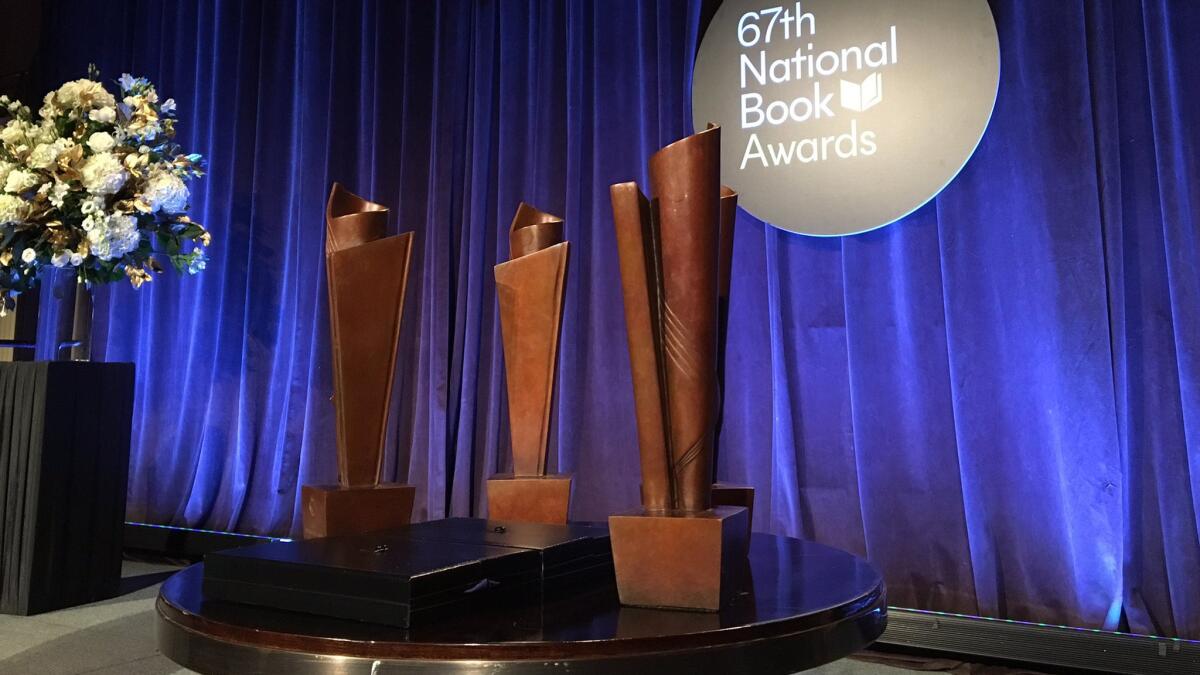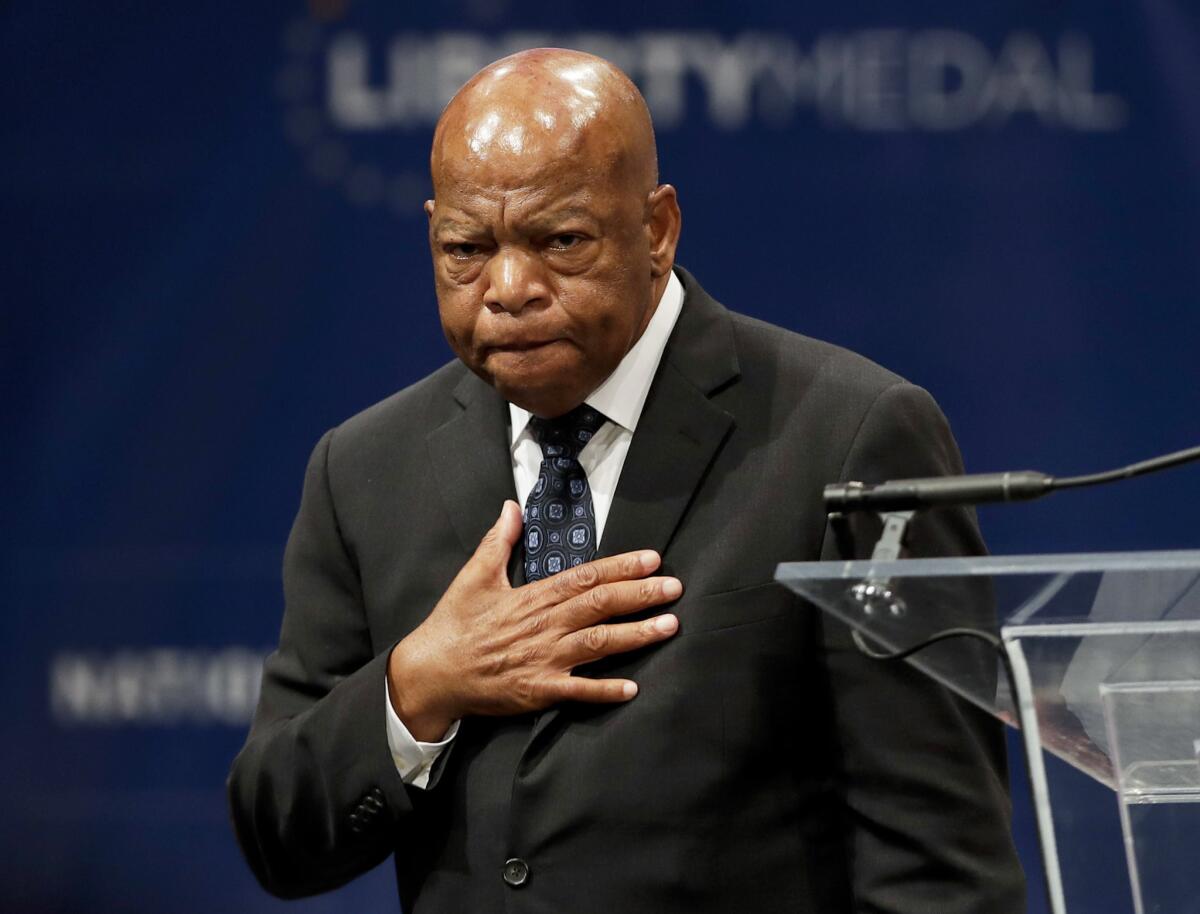The importance of black voices is clear at National Book Awards where Colson Whitehead wins fiction prize

Reporting from New York — In a year plagued by racial tensions, the National Book Awards ceremony on Wednesday night proved that literature is a vital part of our national conversation, not merely an artistic diversion. And the message was clear: In 2016, black voices are to be rewarded and celebrated.
Three of the four competitive prizes went to black authors for books that take on America’s troubled relationship with race. Additionally, the Literarian Award went to Cave Canem, a 20-year-old nonprofit that nurtures a community of African American poets.
At the end of the evening, Colson Whitehead was awarded the fiction prize for his novel “The Underground Railroad,” a deep, creative imagining of a young woman’s escape from slavery. The book scored a rare two-fer this year, first being selected by Oprah Winfrey for her popular book club and now winning one of literature’s most prestigious prizes. Whitehead, like many of the award winners and presenters, split his attention between thanks and addressing America’s future under President-elect Donald Trump, recommending from the stage that people “be kind to everybody – make art – and fight the power.”
As straightforward as that may seem, as a novelist Whitehead is drawn to complexity and bigger themes. “Trump is a reminder that evil never dies,” he told The Times after the ceremony. “The main part of human nature, the American temperament — it will never go away, no matter how many black presidents, or one day, female presidents — but we can fight and resist any way we can.”
One veteran of that kind of fight is longtime civil rights leader U.S. Rep. John Lewis of Georgia, who won the award for young people’s literature for “March: Book Three,” a graphic novel based on Lewis’ experiences in the 1960s, co-written by Andrew Aydin and illustrated by Nate Powell.

Accepting the award, Lewis remembered living in the segregated South. “I grew up in rural Alabama, very, very poor, very few books in our home,” Lewis said. “And I remember in 1956 when I was 16 years old, some of my brothers and sisters and cousins, we went down to the public library trying to get library cards. And we were told that the library was for whites only, and not for coloreds. And to come here — ” he stopped, wiping tears from his eyes as the room burst into applause.
The event was held at a black-tie, high-ticket gala in the heart of Wall Street, hosted by comedian and writer Larry Wilmore. Biographer Robert Caro — who has been with publisher Knopf for 46 years — accepted the Medal for Distinguished Contribution to American Letters. The annual dinner benefits the National Book Foundation, which is raising its profile under new executive director Lisa Lucas.
Normally ebullient, Lucas, who is the first woman and first African American to lead the organization, asked in her speech, “Why are we here tonight? Aren’t there more important matters to attend to?” That reflected the anxiety many attendees expressed about Trump’s election.
Ibram X. Kendi, winner of the nonfiction prize for his rigorous critique “Stamped From the Beginning: The Definitive History of Racist Ideas in America,” had one kind of response. Kendi spent years “looking at the absolute worst of America, its horrifying racism,” he explained in his acceptance speech. “But in the end I never lost faith…. I’ll never lose my faith that you and I can create an anti-racist America. Where Americans are no longer manipulated by racist ideas. Where black lives matter.”
Cave Canem co-founder Toi Dericotte had another answer. Explaining that it was all right to celebrate in times of conflict, she said simply, “Joy is an act of resistance.”
The poetry winner was Daniel Borzutzky for his collection “The Performance of Becoming Human,” published by a tiny independent publisher, Brooklyn Arts Press.
Terrance Hayes, 2010’s poetry winner, presented the award to Canem in a speech that joined the idea of arts and politics.
“Writing is lonely all the time. No organization can change that. But Cave Canem is a kind of fortification. Even if you are not a poet, or black, it is a fortification of your language, your history, your future,” he said. “We have seen a black president; and we are seeing what kind of president comes after a black president. We’ve seen, and we still are seeing, black men and women killed by people sworn to protect them. Our lives remain in danger, which is to say, your lives remain in danger. We need arts organizations like Cave Canem.”
Although the attendees were predominantly white — the publishing industry is 79% to 89% white — host Wilmore announced at the end of the evening, “Let me tell you something. National Book Foundation is woke.”
After Whitehead, the final award winner, left the stage, Wilmore joked, “Thank you, everybody. This concludes BET presents the National Book Awards (with special guest star Caro).”
Winners, in bold, and finalists are below:
Fiction
Colson Whitehead, “The Underground Railroad” (Doubleday)
Chris Bachelder, “The Throwback Special” (W.W. Norton & Co.)
Paulette Jiles, “News of the World” (William Morrow)
Karan Mahajan, “The Association of Small Bombs” (Viking)
Jacqueline Woodson, “Another Brooklyn” (Amistad)
Nonfiction
Ibram X. Kendi, “Stamped From the Beginning: The Definitive History of Racist Ideas in America” (Nation Books)
Arlie Russell Hochschild, “Strangers in Their Own Land: Anger and Mourning on the American Right” (The New Press)
Viet Thanh Nguyen, “Nothing Ever Dies: Vietnam and the Memory of War” (Harvard University Press)
Andrés Reséndez, “The Other Slavery: The Uncovered Story of Indian Enslavement in America” (Houghton Mifflin Harcourt)
Heather Ann Thompson, “Blood in the Water: The Attica Prison Uprising of 1971 and Its Legacy” (Pantheon)
Poetry
Daniel Borzutzky, “The Performance of Becoming Human” (Brooklyn Arts Press)
Rita Dove, “Collected Poems 1974–2004” (W. W. Norton & Co.)
Peter Gizzi, “Archeophonics” (Wesleyan University Press)
Jay Hopler, “The Abridged History of Rainfall” (McSweeney’s)
Solmaz Sharif, “Look” (Graywolf Press)
Young people’s literature
John Lewis, Andrew Aydin and Nate Powell (artist) “March: Book Three” (Top Shelf)
Kate DiCamillo, “Raymie Nightingale” (Candlewick Press)
Grace Lin, “When the Sea Turned to Silver” (Little, Brown Books for Young Readers)
Jason Reynolds, “Ghost” (Atheneum Books for Young Readers/Simon & Schuster Children’s Publishing)
Nicola Yoon, “The Sun Is Also a Star” (Delacorte Press/Penguin Random House)
Follow Carolyn Kellogg @paperhaus on Twitter.
ALSO
National Book Award finalist Viet Thanh Nguyen speaks out on war, capitalism and Donald Trump
Column: How to weather the Trump administration? Head to the library
Review: Zadie Smith’s ‘Swing Time’ is a tour-de-force
UPDATES:
1:10 p.m. Nov. 17: This article has been updated with comments from winners and additional details about the awards event.
This article was originally published at 7:35 p.m. Nov. 16.
More to Read
Sign up for our Book Club newsletter
Get the latest news, events and more from the Los Angeles Times Book Club, and help us get L.A. reading and talking.
You may occasionally receive promotional content from the Los Angeles Times.







